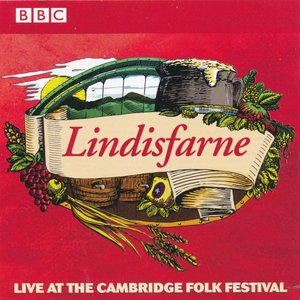Published on May 12, 1999
Live CDs are always difficult for me to like. I always find
something about how they’re recorded or mixed I don’t much
care for, and it spoils my enjoyment of the music itself; also,
live CDs rarely capture the energy or vitality of being there.
There are notable exceptions, but they’re rare and few; most live
CDs are a knockoff released when the band is being lazy but wants
to stay on the charts.
Worse yet, this was a live CD by a band I wasn’t familiar with,
so I settled myself in with pen and paper and cycled through the
tracks… and got a
very pleasant surprise. Not only is this a good live CD,
it’s a CD good enough to make me interested in the studio work of
Lindisfarne; it hooked me in wondering what else they could do.
Rare praise, that.
Lindisfarne first appeared on the British pop scene in 1970 with
their album
Nicely Out Of Tune. Much like the Moody Blues, they were on
hiatus from 1974 to 1978, and on their return recorded solidly
until 1993. Highlights of their career include a 1971 British
Number One album,
Fog On The Tyne, 1978’s
Back And Fourth (with their only American hit, “Run For
Home”), 1985’s
Sleepless Nights, and a 1990 British Number One dance
reworking of their 1971 hit, “Fog On The Tyne”, with British
footballer Paul “Gazza” Gascoigne. In 1995, the tragic death of
co-founder Alan Hull put some doubt on their continued existence,
until 1998’s
Here Comes The Neighborhood.
Despite scraping through the eighties on a series of independent
and small labels, Lindisfarne continued turning out solid work in
their usual vein, a tracery of music somewhere between rhythm &
blues-tinged rock, progressive, and acoustic traditional.
Cambridge was recorded during this period; the first six
tracks of the CD were recorded from a 1982 appearance, the second
six from 1986. While being on a small label can be frustrating in
terms of reward, it can also be liberating in terms of freedom to
experiment; these twelve tracks show that Lindisfarne was and is
still doing what they want to do, a band of Geordie rock and roll
folkies who are just there to play the music.
The production on this CD is excellent. The percussion, often
the bane of live CDs, is tight and smooth; the sound keeps its
punch without being muffled. The vocals are well-mixed, although on
one or two tracks (especially “Start Again”, where the background
singer was almost more prominent than the lead; a poor choice for
the first track — keep listening past it) I would have liked to
have seen them punched up a bit. The harmonica and saxophone are
crisp and biting, used to great effect on “I’m A Lover, Not A
Fighter” and “Fog On The Tyne”. “Winning The Game”, originally
released in the mid-eighties, has a very Camel-like feel, and “Lady
Eleanor”, from 1971, is soft and haunting.
The greatest praise must be reserved, however, for the standout
version of 1978’s “Run For Home”. I’d never heard this song
before… indeed, I’d never heard any of these before… but
listening to the audience sing along with the song
before Lindisfarne kicked in took my breath away, and the
power, punch, and arch of the recording did nothing to diminish it.
I don’t know if the original is that good — I’d like to find out
— but at that 1986 Cambridge performance, no punches were
pulled.
Overall, this is an excellent introduction to Lindisfarne’s
work, an excellent live album, and a darn fun hour or so of live
British folk-blues rock. It comes heartily recommended. Lindisfarne
has gone a good 25 years without really ever getting the
appreciation they deserved; we can’t really change that, but we can
enjoy them nonetheless.
